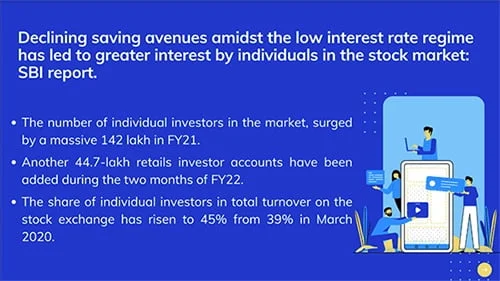In our last blog, we dissected the delicate topic of how Personal Finance is ‘personal.’ Today, we dive a little deeper down the personal finance avenue. As a financial advisor, I often get questioned, ‘How much gains can I expect if I follow your advice?’
This question keeps reminding me of the famous ad by Maruti, ‘Kitna deti hai?’ which ultimately catapulted in a scenario where competitors too flashed the mileage their vehicles offered in their ads that followed. This question brilliantly sums up the Indian consumer’s obsession with mileage, which is equivalently witnessed in the financial domain.
This psychology of sorts defines the short-term view investors have towards their gains. A psychological feature in which people place more emphasis on short-term results than long-term outcomes is known as Recency bias. It hampers their long-term growth potential.
Then comes this, FOMO (Fear Of Missing Out):

Nobody wants to miss the bus:
Hence the present bull-run has caught the eye of novice investors who want to get a piece of the pie.
What investors fail to realize is that this is a short-term scattered approach to investing. Investors who do not have a streamlined process with set financial goals and knowledge of their risk appetite are likely to invest haphazardly. They might even try to time the market and end up investing in instruments that do not match the right investment strategy or align with their long-term financial goals.
Consider this
You decide to go sky diving. You read up on all the information you can get your hands on to understand what you need to do when you jump off that plane. You’ve read all the instruction manuals and people’s blogs. You may have even gone the extra mile to speak to others who have had a first-hand experience.
You accumulate all this scattered information and make a firm decision about your jump. You choose to skip the trial run with the instructor or even have him join you on the diving experience. Why? Because you have all that you need. Equipped with all the information and necessary equipment, you get onto that plane and plunge out of the window.
The chances of you accomplishing the feat like a pro are 50:50. There is a 50% chance you get overwhelmed by fear and possible anxiety, making you incapable of making a rational decision to open your shoot on time. You could even land up maneuvering yourself to an unknown area. The probability of such a disaster reduces drastically, only if you had chosen to dive with an instructor by your side.
Such is the investing scenario, too; we are bombarded with tons of information of the latest news on what’s hot in the market or the best investment products, or even the right stock that has proven to be beneficial for a friend/family member. Unless any of this comes from a financial expert who understands your financial goals and long-term needs, this information is just noise.
Numerous cognitive biases come to play when investors jump into the financial market. Without the help of a guide, these biases can take over your decision-making process and cause you to stray away from the big picture. It is through this noise and range of cognitive biases that an advisor can help you wade through.
Remember, mileage or results are one part of your investment journey. Wading through this noise and filtering the advice that suits your financial needs is where you need an advisor the most. Choose an advisor you trust who acts as your fiduciary and chooses knowledge over the noise to help you through your financial decision-making process. Let them advise you, and see the magic compounding does in the long run.
Think of it this way, would you choose a medicine that a chemist recommends over what a doctor has prescribed after examining your complete medical condition?
Choose wisely. Happy investing!


Leave a Comment